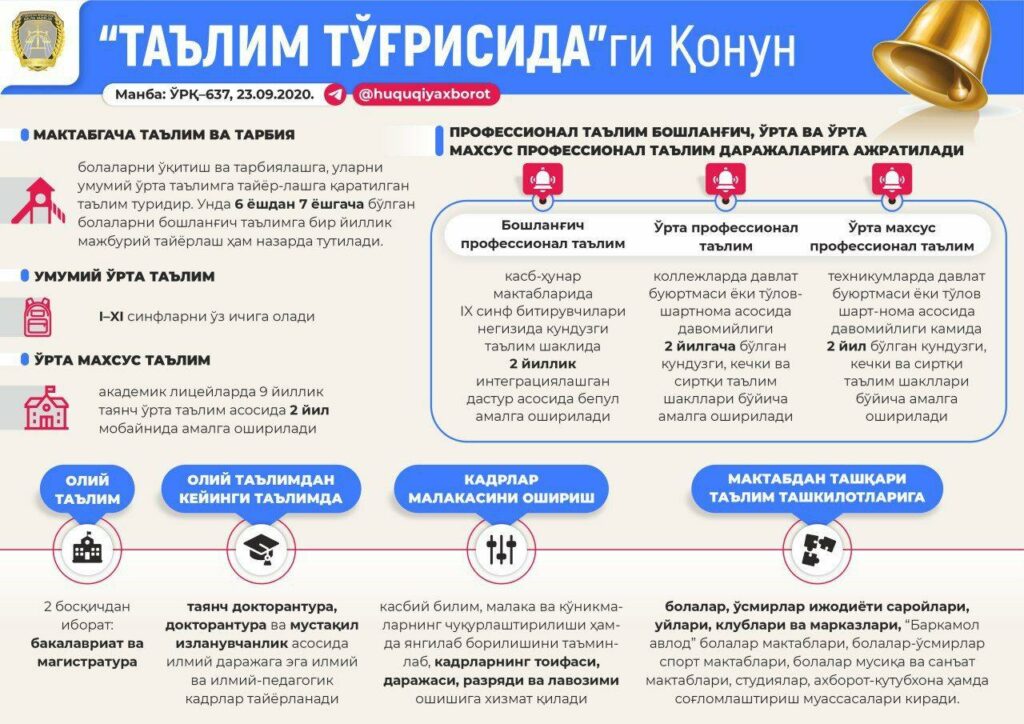(Uzbek) “Ta’lim to‘g‘risida”gi Qonunning mazmun-mohiyati

The essence of the Law “On Education”.
LRU-637, 23.09.2020
The law guarantees equal rights to education for everyone, regardless of gender, race, nationality, language, religion, social origin, belief, personal and social status.
Types of education include:
• preschool education and training;
• general secondary and secondary special education;
• professional education;
• higher education;
• post-higher education;
• retraining of personnel and improvement of their qualifications;
• extracurricular education.
General secondary education includes courses 1-11.
Professional education is divided into primary, secondary, and secondary special professional educational levels.
Primary professional education is carried out free of charge on the basis of 9-course graduates in the form of full-time education on the basis of a 2-year integrated program.
Secondary professional education is carried out in colleges on the basis of a state order or payment contract in the form of full-time, evening, and part-time education with a duration of up to 2 years.
Secondary special professional education is carried out in technical schools in the full-time, evening, and part-time forms of education with a duration of at least 2 years based on a state order or payment contract.
Post-graduate education can be obtained in higher education and scientific organizations.
Post-higher education provides training for scientific and scientific-pedagogical personnel with a scientific degree on the basis of basic doctoral studies, doctoral studies, and independent research, which involves the in-depth study of a specialty and conducting scientific research in order to prepare and defend a doctoral dissertation.
Forms of education:
* education separated from production (day time);
* education without separation from production (external, evening, online);
* dual education;
* family education and independent education;
* training and education of adults;
* inclusive education;
* external education;
* personnel training in the field of defense, security, and law enforcement activities.
According to the law, state higher education, secondary specialized, professional educational institutions and their branches, as well as higher, secondary specialized, professional educational organizations with state participation and their branches are established by the decisions of the President or the Government.
The organization of non-state educational institutions is carried out by their founders.
Non-state educational organizations are licensed by the State Inspectorate for Quality Control of Education.
Admission to educational institutions is carried out on the basis of the principle of providing equal opportunities for all applicants, with the exception of certain categories of persons, who may be granted privileges in accordance with legislation.
Educational organizations provide applicants and (or) their parents or other legal representatives with a charter, license (for non-governmental educational organizations), state accreditation certificate, curriculum and other regulations regulating educational activities. documents, it is necessary to introduce the rights and obligations of learners.
Children with physical, mental, sensory or mental disabilities are admitted to school based on the consent of their parents or other legal representatives and the conclusion of the medical-psychological-pedagogical commission.
Admission to some educational organizations (higher educational institutions, academic lyceums, presidential, creative, specialized schools, etc.) is carried out on the basis of selection.
Admission to state institutions of higher education and professional education is carried out on the basis of a state grant and (or) payment contract.
Admission of foreign citizens to the state educational institutions of Uzbekistan is carried out on the basis of a payment contract (except for cases where a state grant is allocated).
The procedure for admission to state educational institutions is determined by the Cabinet of Ministers.
The procedure for admission to non-state educational organizations is determined by these educational organizations.
The parameters of admission to higher education institutions on the basis of a state grant are determined by the President.
During admission to higher education institutions, additional admission parameters are determined for the privileged contingent.
Also, with this Law, the Laws of August 29, 1997 “On Education” and “On the National Program of Personnel Training” became invalid.
This Law shall enter into force from the date of its official publication.
The procedure for admission to non-state educational organizations is determined by these educational organizations.